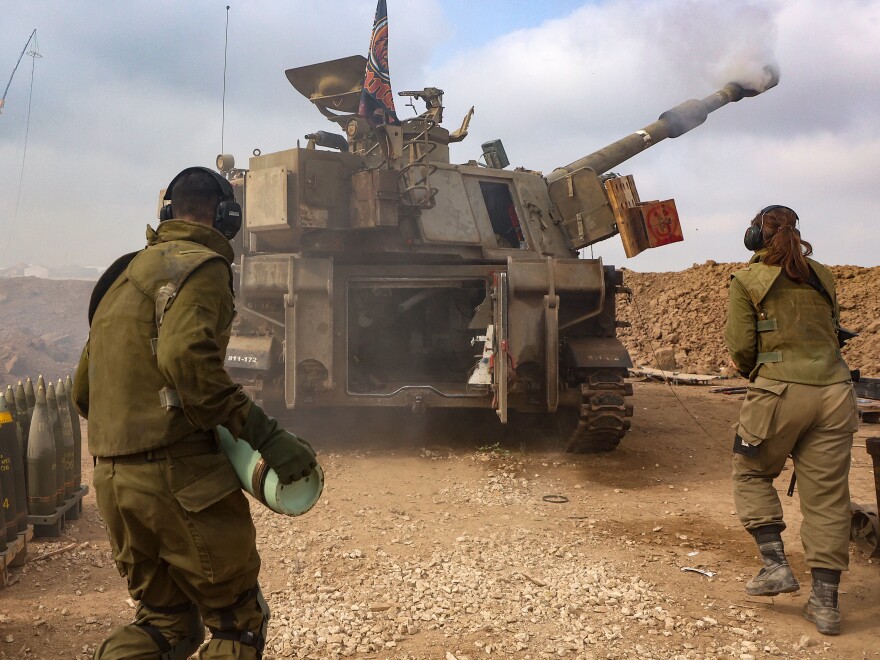JERUSALEM — Israel's military on Tuesday appeared to be encircling Gaza's second largest city, Khan Younis, pushing hundreds of thousands of Palestinians deeper south and hobbling international relief groups already struggling to deliver aid to the besieged territory.
While the Israel Defense Forces expanded its offensive in northern and central Gaza, it said it had raided the Jabaliya refugee camp in northern Gaza for the first time in pursuit of Hamas targets. Meanwhile, Palestinian residents said Israeli troops have advanced near Khan Younis, a Hamas stronghold that is home to the top Hamas leader in the territory. The heavy fighting overnight forced many to flee to the southern city of Rafah, along the Egyptian border.
UNRWA, the United Nations relief agency that aids Palestinians, put the humanitarian concerns bluntly: "We have said it repeatedly. We are saying it again. No place is safe in Gaza."
"The level of human suffering is intolerable. The resumption of the military operation and its expansion further in southern Gaza is repeating horrors from past weeks," it said in a post on X (formerly Twitter).
Satellite images taken Sunday showed Israeli troops massing outside Khan Younis, according to The Associated Press. The city had a pre-invasion population of more than 400,000 people.
More than three-quarters of Gaza's 2.3 million people have been displaced by the Israeli offensive, which was launched in response to the Oct. 7 attack by Hamas that Israel says killed 1,200 people. Israel's air and ground offensive in Gaza has killed more than 15,000 people, according to the health ministry in Hamas-governed Gaza.
In a statement on Tuesday, Israel's military said that since the beginning of ground operations in Gaza some five weeks ago, it had fired 100,000 artillery shells in the territory that occupies just 140 square miles.
Urgent pleas from aid groups
The heightened Israeli bombardment came as Israel has been under pressure from the U.S. to minimize civilian casualties in Gaza and international relief groups said they were finding it increasingly difficult to distribute aid to refugees from the fighting.
The head of UNRWA said Israel's bombardment of southern Gaza was further strangling aid deliveries and increasing "mass displacement" of Palestinians.
"The number of civilians killed is rapidly increasing. Civilians, including men, women, children, older persons, the sick and people with disabilities are the most to suffer," Commissioner-General Philippe Lazzarini said Monday.
UNRWA warned that 600,ooo Palestinians in Gaza had been ordered to move to avoid death and injury amid the Israeli bombardment. The agency said an influx of people internally displaced by the conflict to Rafah, Gaza's southernmost governorate, could more than double the area's normal population, further straining relief efforts.
The Palestinian Red Crescent Societies (PRCS) on Tuesday said Israeli tanks had targeted "the vicinity area of two PRCS ambulances," as the injured and dead were being transported. It said the attack occurred in central Gaza near the city of Deir al Balah. "One paramedic was lightly injured and the ambulances were damaged," it said.
The PRCS also said it had "lost contact" with its operations room in Gaza due to a telecommunications blackout. It expressed concern for the safety of its teams in Gaza "amidst the ongoing and intense Israeli airstrikes around the clock" and worried about its ability to continue to provide emergency services," adding that a lack of communications "hinders the arrival of ambulances to the injured and wounded."
Meanwhile, the director-general of the World Health Organization said that Israel's military had notified the WHO of the need to "remove our supplies from our medical warehouse in southern Gaza within 24 hours, as ground operations will put it beyond use."
"We appeal to Israel to withdraw the order, and take every possible measure to protect civilians and civilian infrastructure, including hospitals and humanitarian facilities," wrote Tedros Adhanom Ghebreyesus in a post on X.
Israel's Coordinator of Government Activities in the Territories (COGAT), a unit of the Ministry of Defense, said Tuesday that 180 aid trucks carrying food, water, shelter equipment and medical supplies were dispatched through the Rafah crossing with Egypt.
In addition, two diesel fuel tankers were sent, a COGAT spokesperson said. The fuel is "designated for the operation of vital infrastructure in the Gaza Strip," the spokesperson said.
Copyright 2024 NPR



